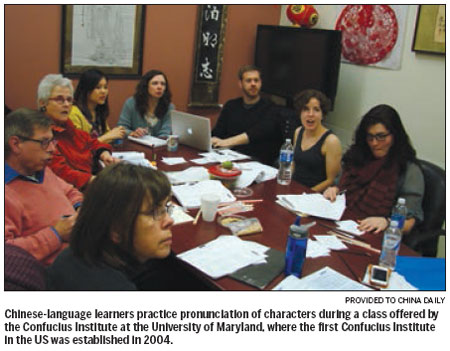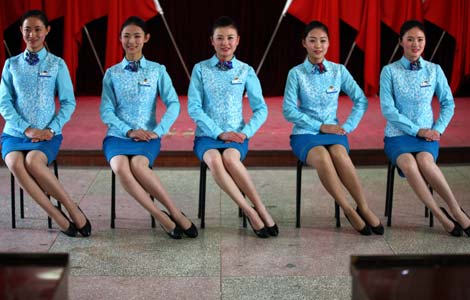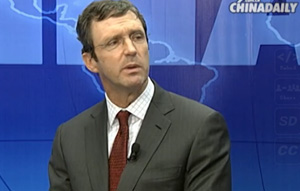Confucius Institute meets a need
Updated: 2013-11-22 14:39
By Cai Chunying (China Daily USA)
|
||||||||

Never say 'no'
At the opening ceremony of the Confucius Institute at George Washington University (GWU), the first in the US capital, in April, director-general Xu told the audience, "We will never say 'no' as to which activity you do or which program to use. You are free."
With his university's global strategy in mind, GWU President Steven Knapp further embraced the initiative by serving as the chair for the newly-formed US center. He also recently joined the Council of Confucius Institute Headquarters, a combined governing body and advisory board for Confucius Institutes worldwide.
The council includes 10 foreign members, consisting mostly of presidents of universities from five continents.
"The Confucius Institute makes it easier for our students to really understand the world in a more rich, complex and subtle way, which will help prepare them for the kind of interaction with others that is part of what it means to have a truly global education," Knapp told China Daily.
Andrew Chester, a recent graduate of GWU, impressed the visiting Chinese Vice-Premier Liu at an event given by the university's Confucius Institute this Wednesday. Chester recited, in the original Chinese, an early 1920s poem by the renowned Chinese writer Xu Zhimo about his wistful departure from the University of Cambridge. Chester majored in biology and studied Chinese as a minor.
For Hanban, setting up Confucius Institute is the answer to the ever-increasing demand from people around the word to learn the Chinese language, as showcased by Chester.
According to China's Ministry of Education, 30 million people were studying Chinese worldwide as of December 2012. The number of foreigners taking the international Chinese proficiency test, the HSK, rose to 3.5 million in 2012 from 117,660 in 2005.
Cui Jianxin, associated director of the Confucius Institute at UMD, has witnessed that surging interest first hand. He said that so far this year more than 800 people took the HSK test at his site, more than the total number last year. When the test was first offered by the institute in 2004, there were only a couple of dozen applicants.
Recognizing the shortage of qualified instructors to teach Chinese in elementary and secondary public schools in the US, Donna Wiseman, dean of the College of Education at UMD who also serves as the director for the Confucius Institute, took the initiative to build a Center for Chinese Teacher Certification and Development, using a grant funded by Hanban. The 30 or so students who graduated this year with the teaching certificate all obtained jobs, according to Cui.
For many universities, a Confucius Institute also meets their demands of furthering research collaboration with Chinese universities. This is the case for Frances Sun, managing director of the young Confucius Institute at GWU, whose Chinese partner institution is Nanjing University, a top one in China.
"Our Confucius Institute builds on the partnership we already had established between the two universities. We see our collaborations growing even further," Sun said. She led a delegation of faculty members from eight disciplines at GWU to Nanjing University this summer, exploring additional collaborative research and teaching opportunities.

 Oil pipeline blast leaves 22 dead in E China
Oil pipeline blast leaves 22 dead in E China
 Good couples get better
Good couples get better
 More than 9m Syrians need humanitarian aid
More than 9m Syrians need humanitarian aid
 50th anniversary of the assassination of Kennedy
50th anniversary of the assassination of Kennedy Blueprint tightens EU links
Blueprint tightens EU links
 Beckham promotes bodywear in Shanghai
Beckham promotes bodywear in Shanghai
 Service seminar for E China train attendants
Service seminar for E China train attendants
 Kennedy cousin Skakel poised for prison release
Kennedy cousin Skakel poised for prison release
Most Viewed
Editor's Picks

|

|

|

|

|

|
Today's Top News
Wang named Asia's businessman of the year
Bitcoin rollercoaster hits China
US President sets new date for Asia visit
Bid to boost people ties
Manufacturing PMI seen moderating in Nov
Kennedy cousin Skakel poised for prison release
'Tapering' of QE would benefit world
Blueprint tightens EU links
US Weekly

|

|






